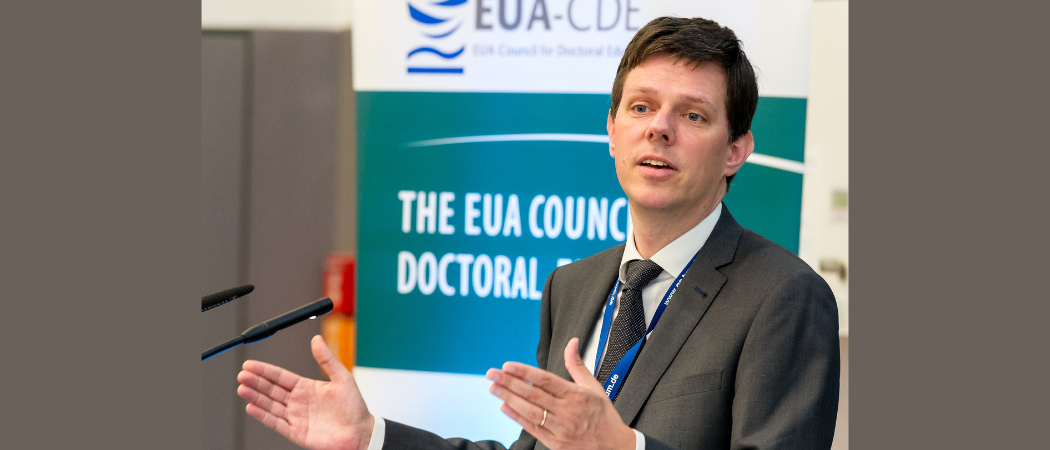The EU’s concerns about economic security are legitimate, but protective measures must be proportionate and precise to ensure they respond to the actual risks. There should not be blanket bans on international research cooperation

Thomas Jørgensen, director for policy coordination and foresight at the European University Association
The newly launched European Economic Security Strategy aims to address Europe’s economic vulnerabilities at a time of heightened geopolitical tensions. Among other objectives it sets out to better define technologies that are critical for Europe, or which have potential dual civil and military use.
This might bring clarity about the opportunities for - and limits of - international research cooperation, but it also risks further tightening constraints on cooperation in the name of security. The academic community should recognise that economic security is a concern. That said, it must also make sure that measures are sufficiently fine-grained to identify concrete risks and not work with blanket bans on cooperation when it comes to whole technologies or countries.
The main point of concern about knowledge sharing in the strategy is about making sure that Europe reduces its dependencies and limits the sharing of critical knowledge. This is in line with established ideas about strategic autonomy within the European Commission, particularly in the interpretation of industry Commissioner Thierry Breton, that Europe must not let itself be dependent on non-EU suppliers in key strategic areas. This is the thinking behind initiatives such as boosting European production of semiconductors, diversifying supply of raw materials, and managing critical technologies.
The discussion on critical technologies is already well developed in the defence sector, with new investment plans and the Commission setting up an Observatory of Critical Technologies. The strategy takes this somewhat further, looking to compile a more precise list of “technologies deemed to be critical for economic security”. This comes on top of refining existing regulation on dual use technology. With these two initiatives, the tenor is one of promoting the development of technologies in Europe and preventing ‘leakage’ of knowledge that the EU would not like to see shared across the world.
While this may sound potentially draconian, the strategy also defines principles that limit the potential restrictions on international cooperation: processes must be proportionate and precise to “ensure that measures respond to the risks themselves.”
Risk-based approach
A similar risk-based approach is also the basis of the European Commission’s approach to foreign interference in research, which keeps cooperation open by default and looks at procedures that can concretely identify risks. If a certain cooperation measure entails risks, these can at times be mitigated – for example, by carrying a clean laptop for travel. At times, cooperation can be halted - for example, if technologies can be used for military purposes or if there are risks to the security of travelling researchers, or of those in the partner institutions.
Here, risks are identified concretely and not through complete bans on working with specific partners or cooperating on specific technologies.
Implementing a European Economic Security Strategy in a way that works for research and education will depend on the granularity of approaches as well as the political definition of risk. It would be counter-productive to define whole countries or sectors as being ‘at risk’, unless the situation becomes as extreme as it has over Russia’s invasion of Ukraine.
Instead, risks need to be defined by the specific activity and be based on negative lists, which define limits but leaves everything else open. There is also a need to discuss the political nature of the definition of risk. Universities might stop travel to certain countries because they fear for the safety of their researchers, or they might end cooperation for reasons of research ethics. These are decisions based on university policies and values. Limiting cooperation because the EU decides that a certain area of research is too critical to be shared is quite another matter, and it can quickly evolve into highly intrusive political steering of academic life.
Here, the strategy’s stated ambitions to identify economically critical technologies and work on the definition of dual use could indeed provide greater clarity. However, these are bound to be political decisions imposed on the academic community, and they will be based on definitions of risk that do not stem from academic values. It is difficult not to fear that these initiatives will put further limits on international research cooperation, for reasons that universities do not necessarily share.
Another worry would be the omission in the strategy of academic soft power. Instead, this is limited to Brussel’s’ regulatory clout, where standards set in the EU are followed globally. The potential of people-to-people contact, good will, and understanding that come from academic cooperation – from student exchanges to research projects – should not be forgotten when thinking about European economic security.
Science diplomacy in its soft version of bringing people together is an important tool to consolidate Europe’s place in the world. Indeed, it can form a bulwark against misinformation about Europe, while furthering Europeans’ understanding of the wider world.
In response to the Economic Security Strategy, the knowledge community should recognise that there are legitimate concerns. However, we must also work for a fine-grained approach to risk, which keeps open as the default for cooperation. It should look out for uses of risk as a tool for political steering, and it should underline academic cooperation as an essential part of Europe’s soft power.
Thomas Jørgensen is director for policy coordination and foresight at the European University Association.





 A unique international forum for public research organisations and companies to connect their external engagement with strategic interests around their R&D system.
A unique international forum for public research organisations and companies to connect their external engagement with strategic interests around their R&D system.